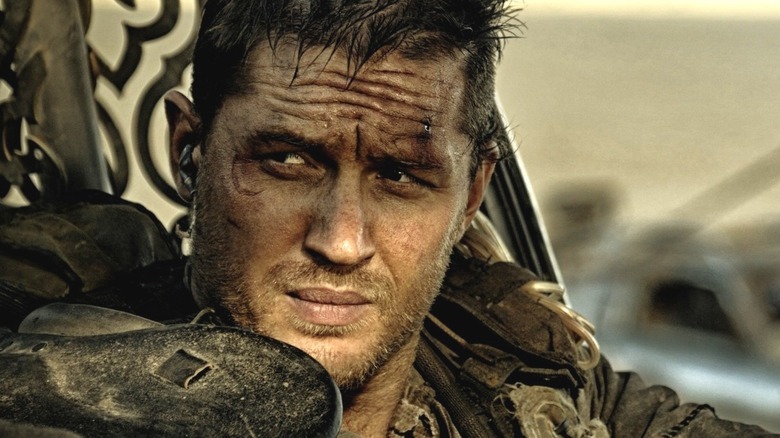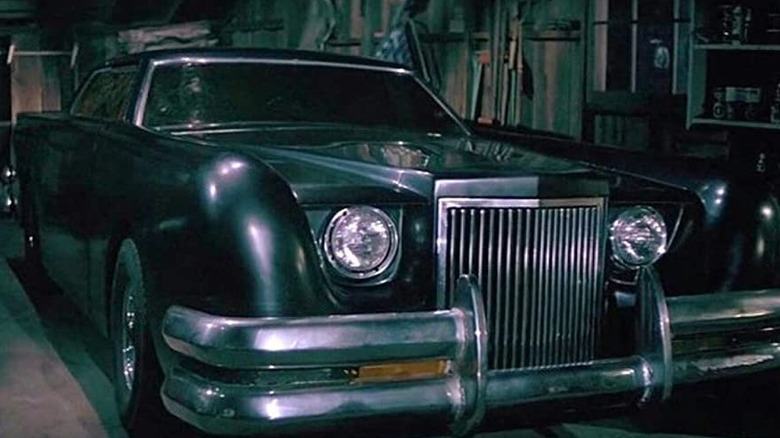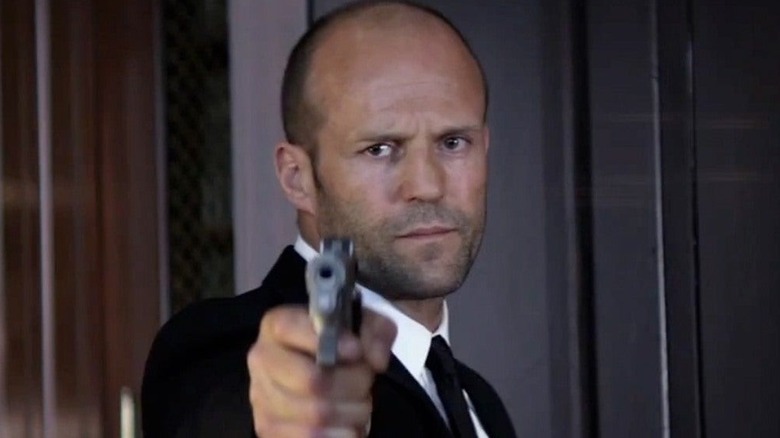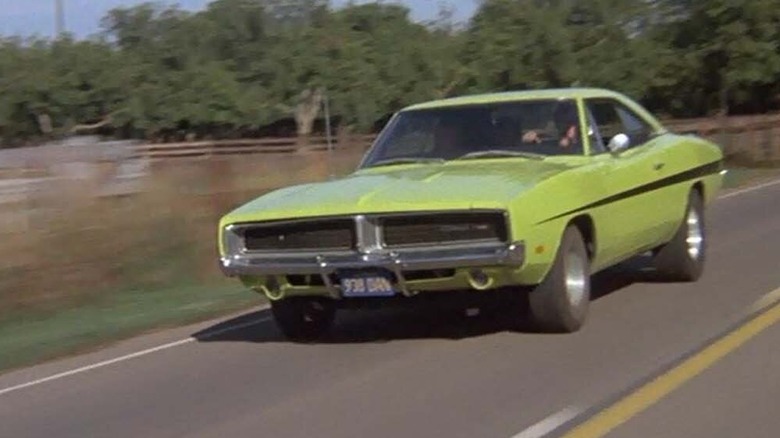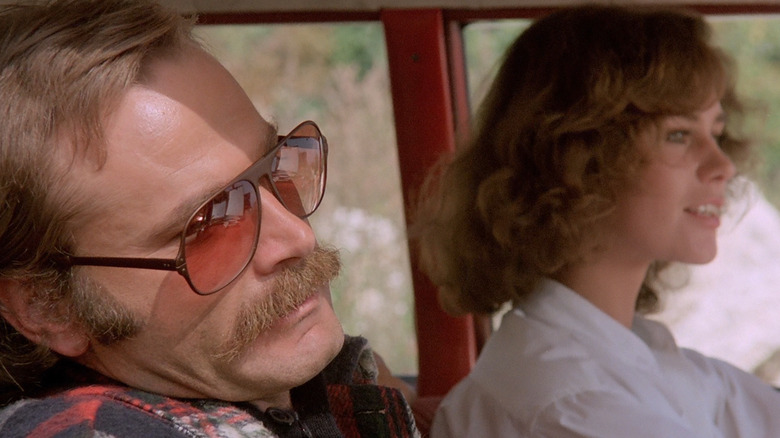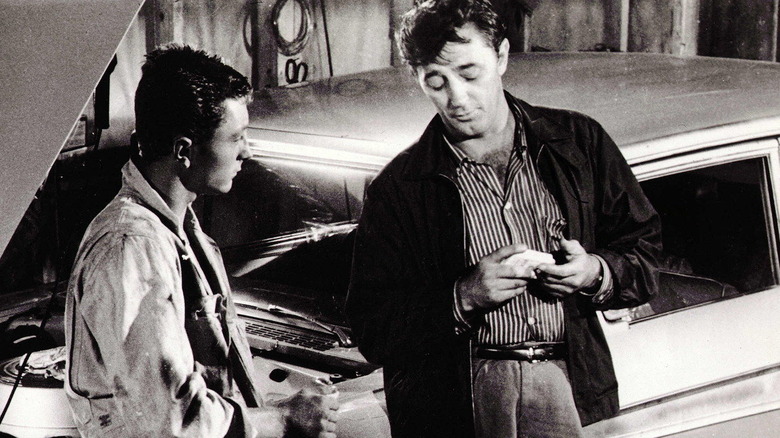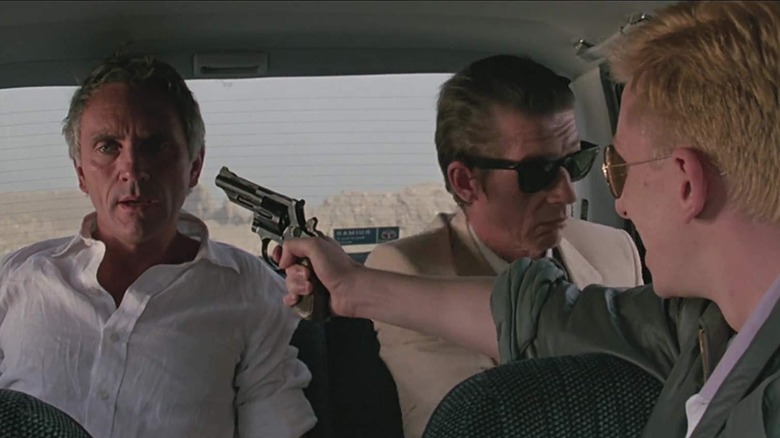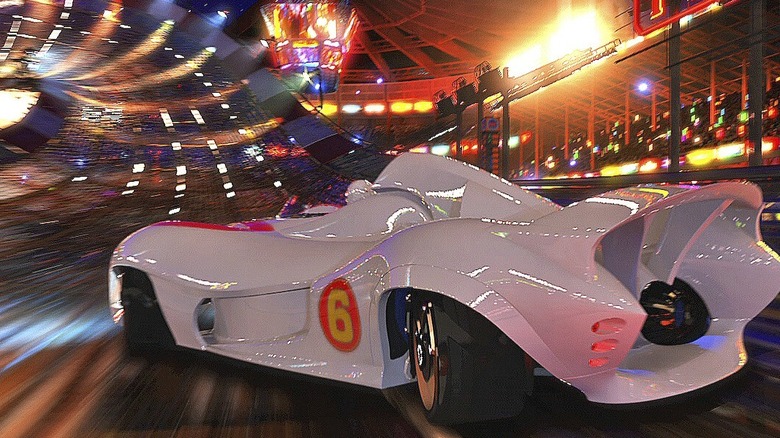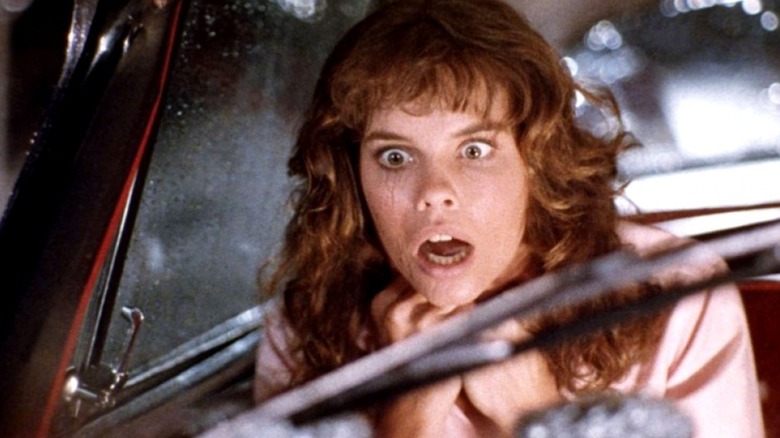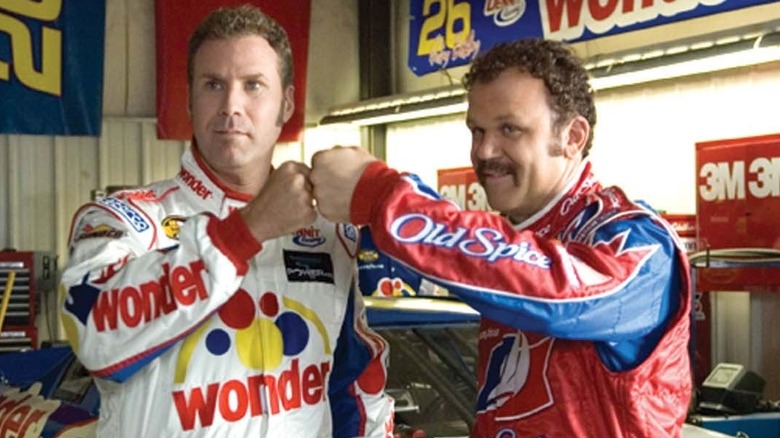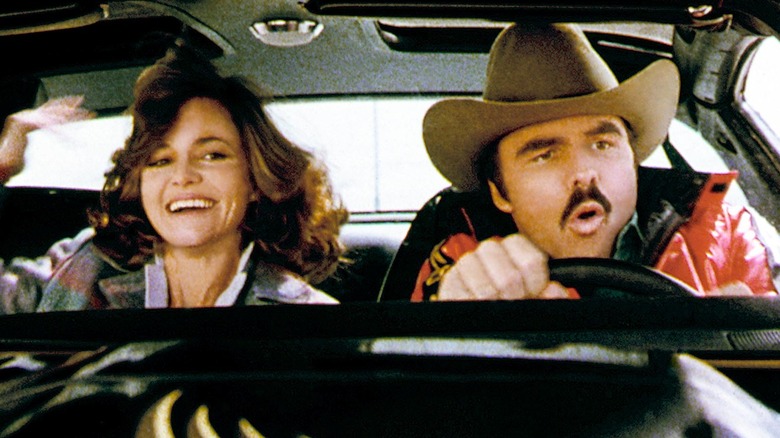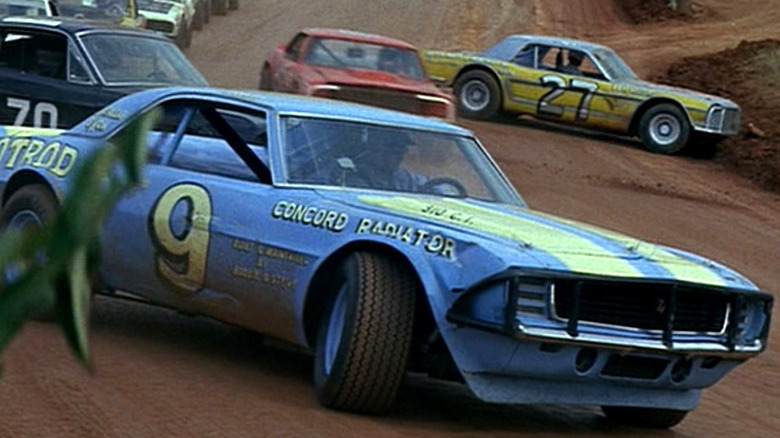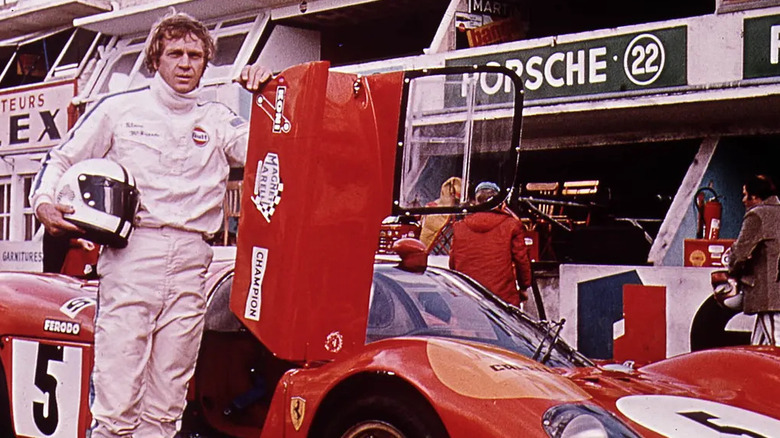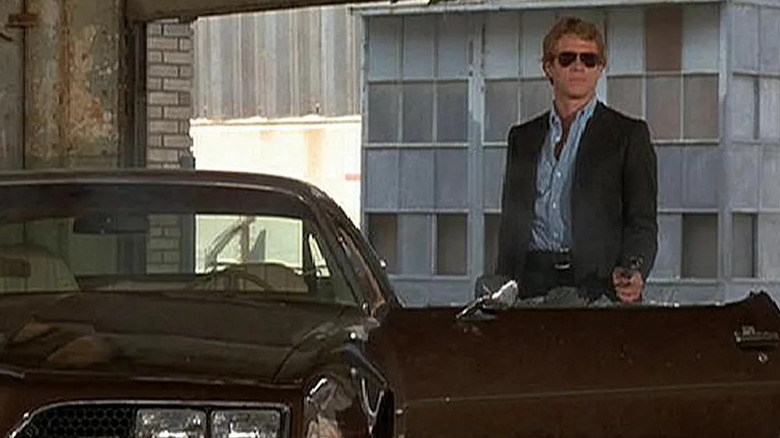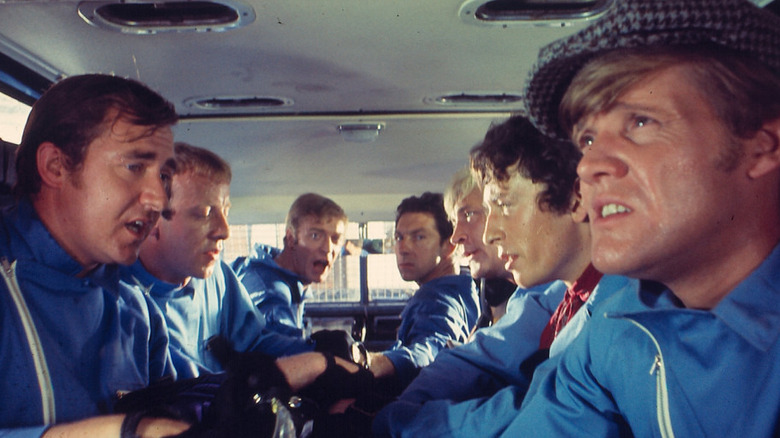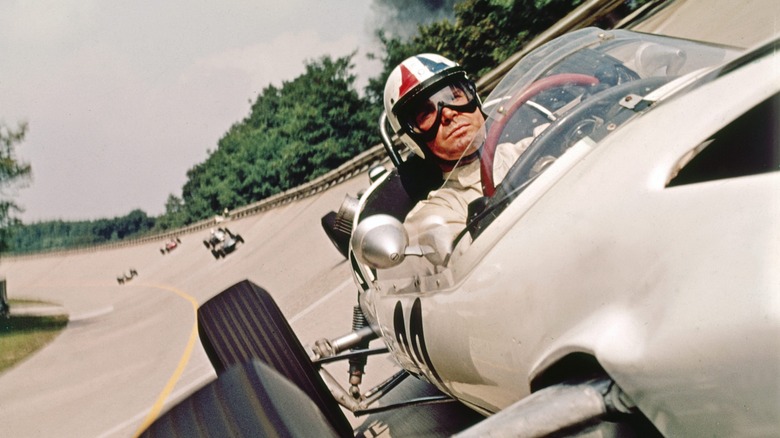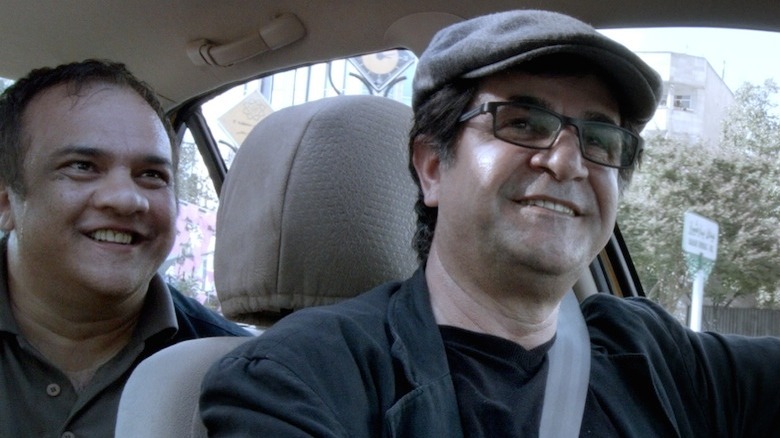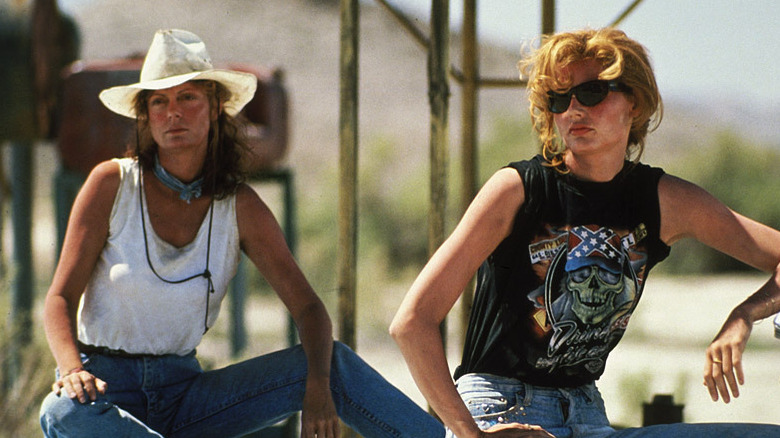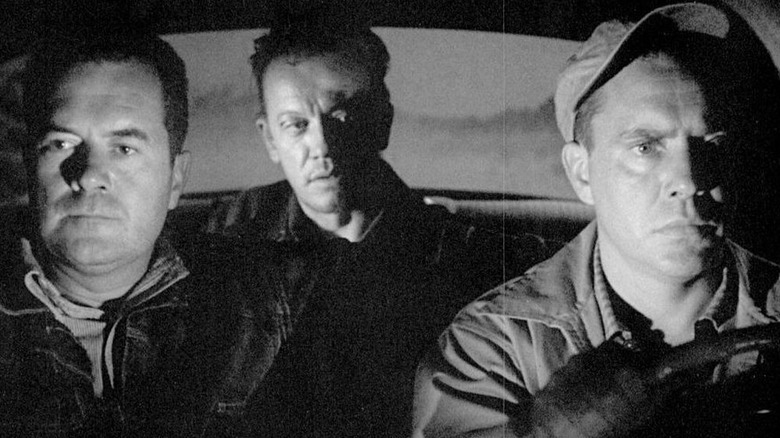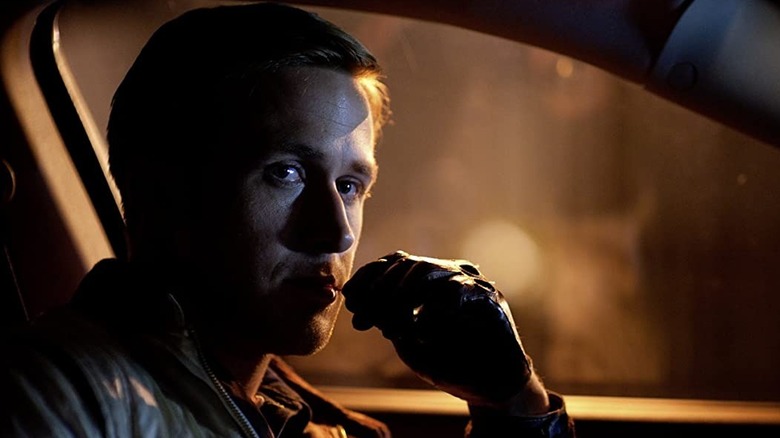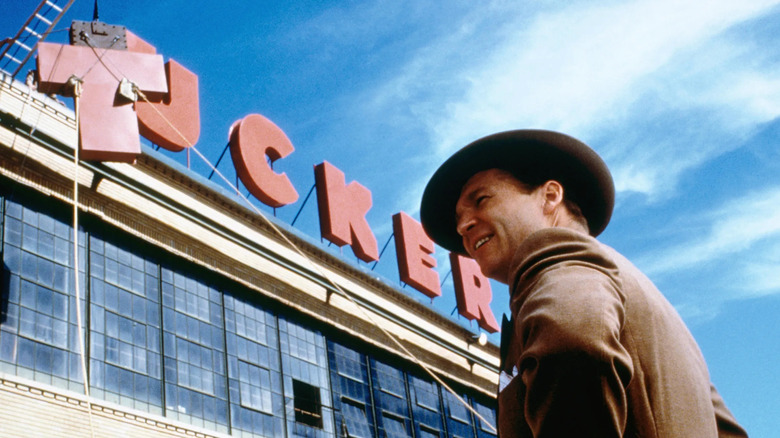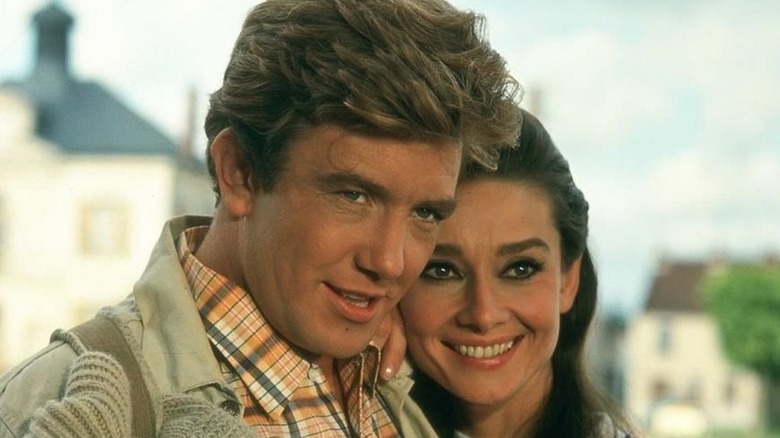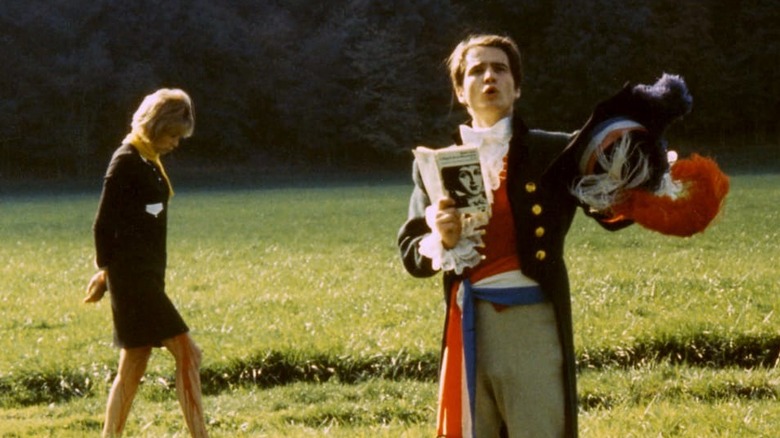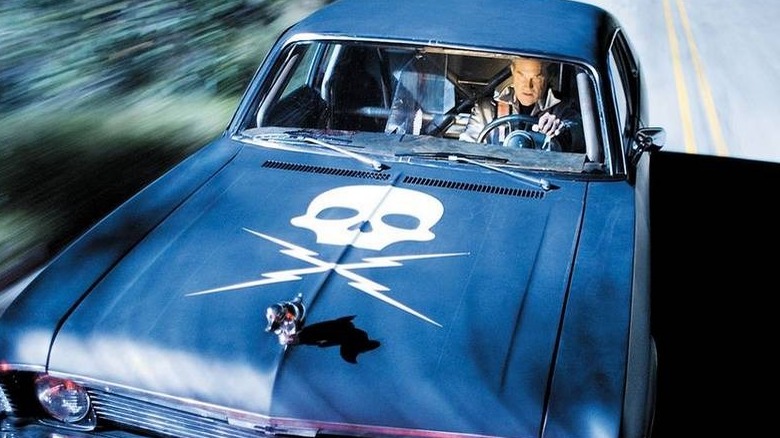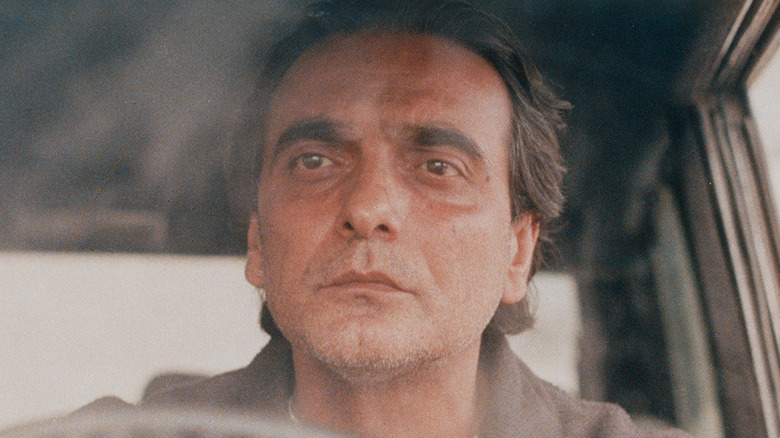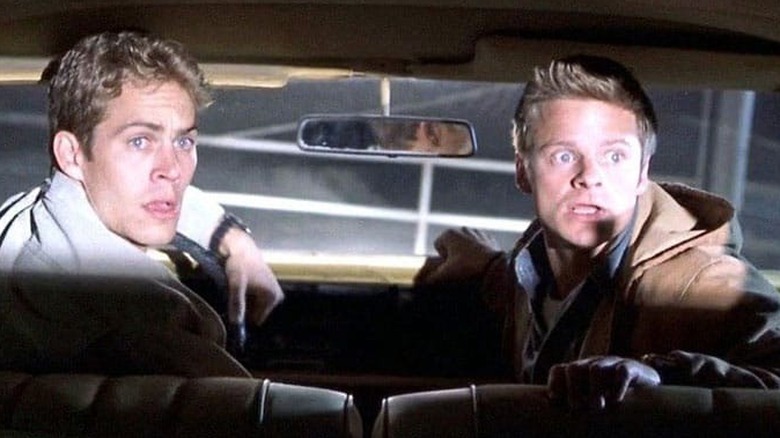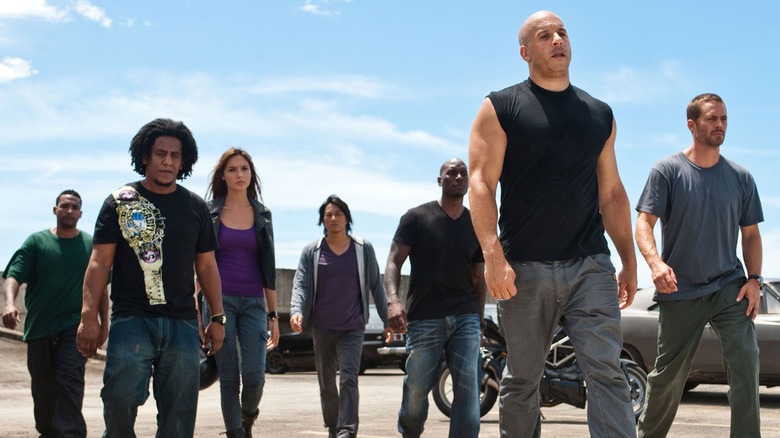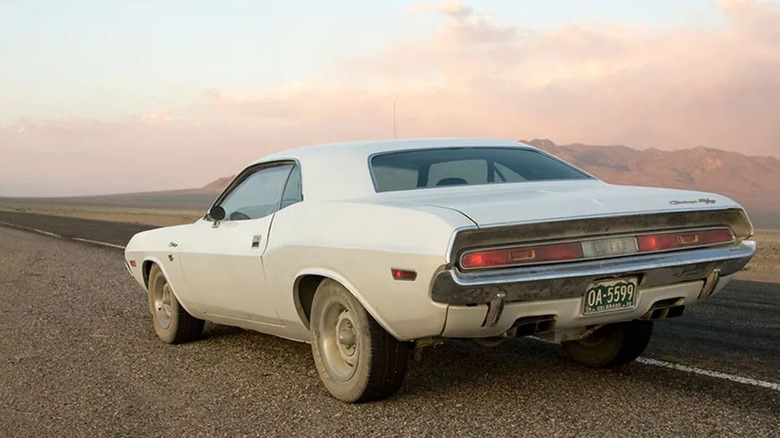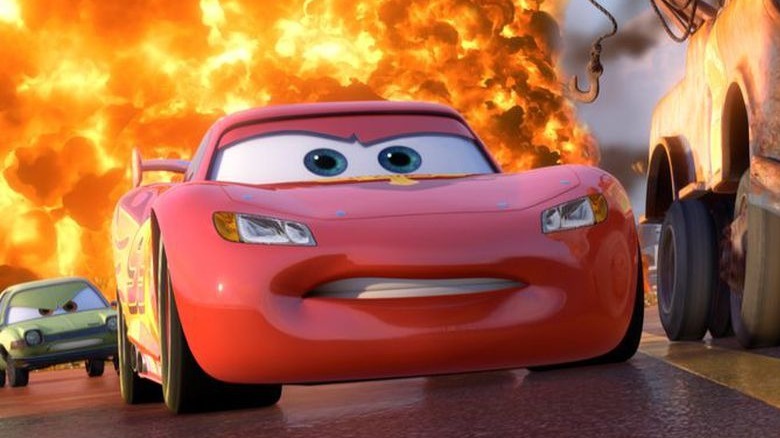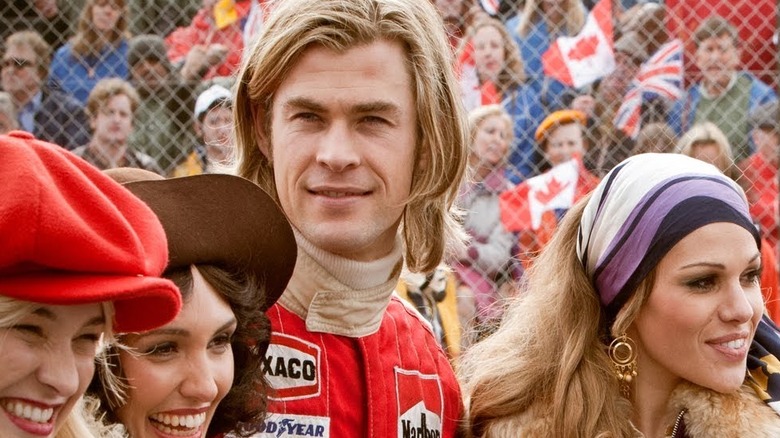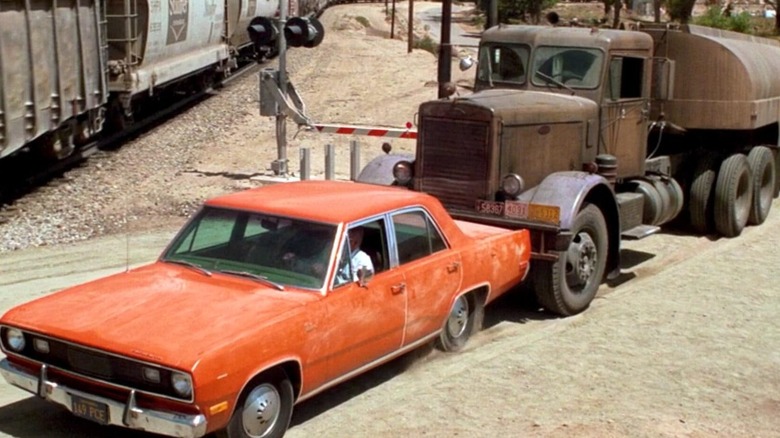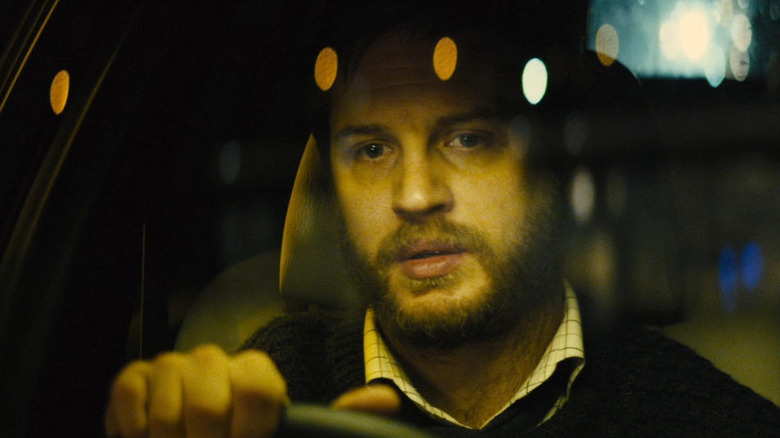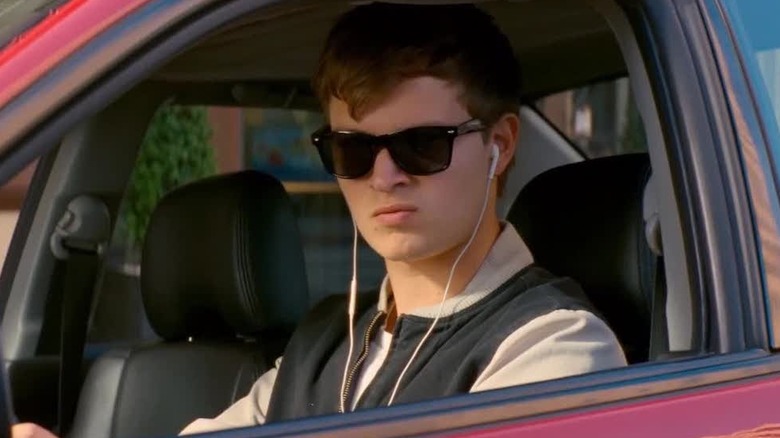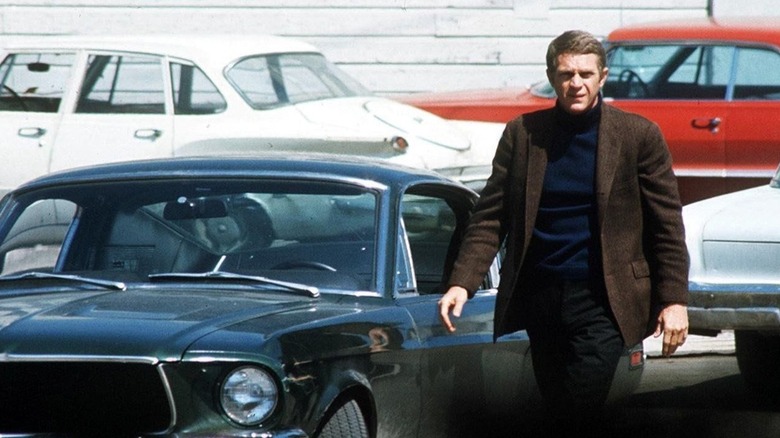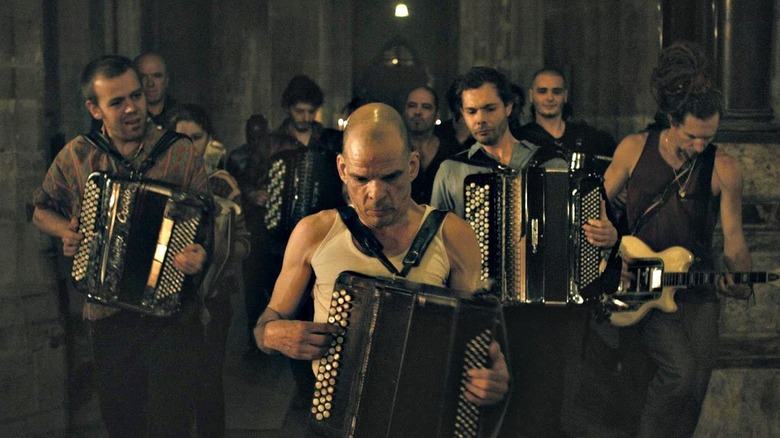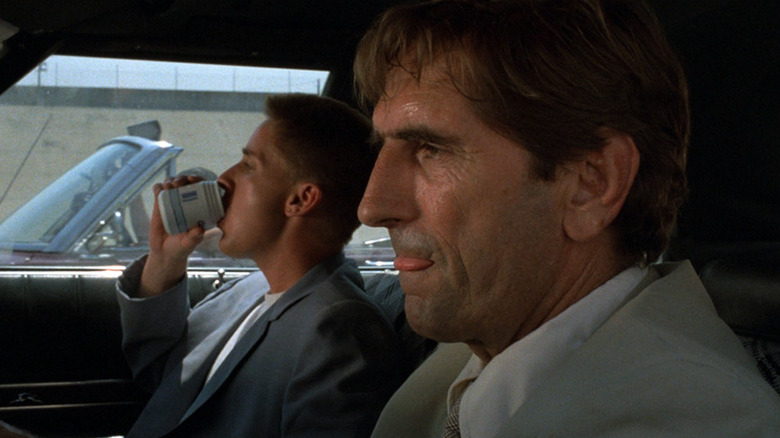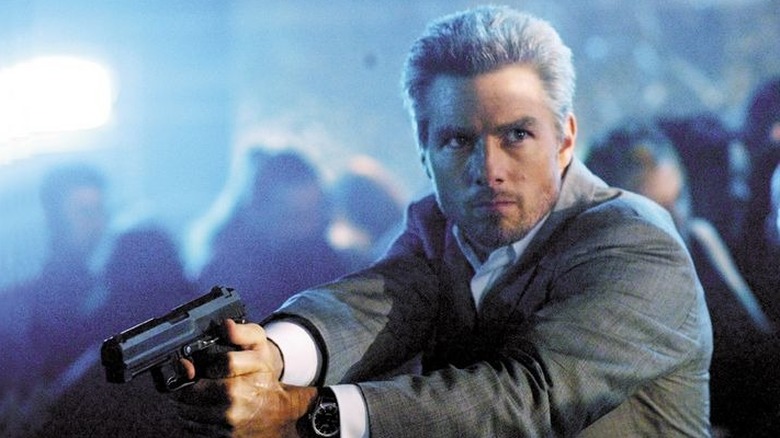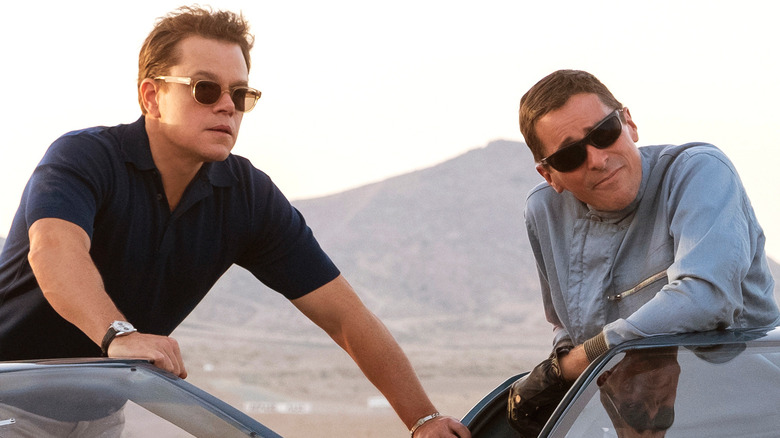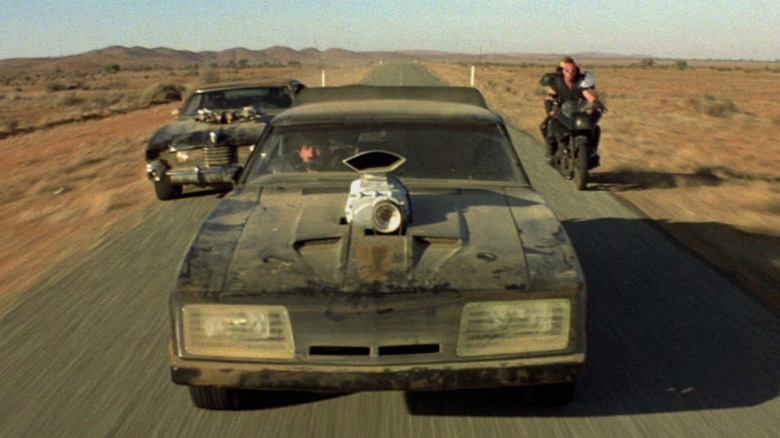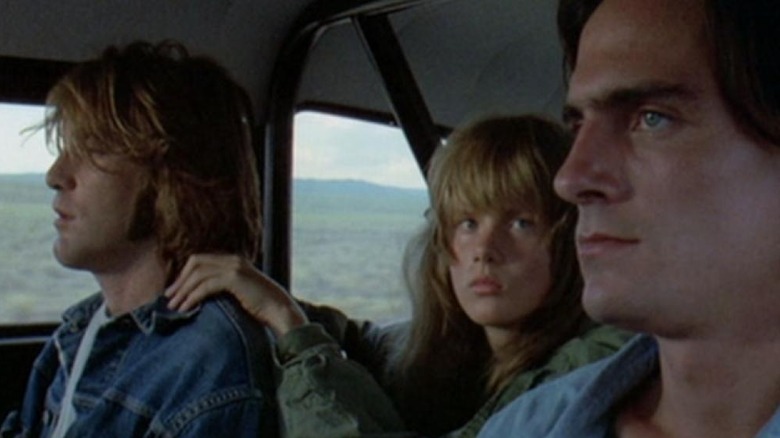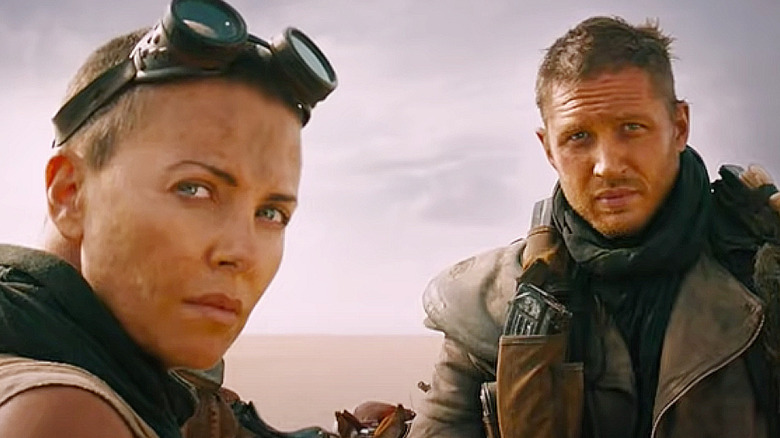40 Best Car Movies Of All Time Ranked
Racing movies, road trip movies, cat-and-mouse horror flicks, fast-paced crime films with getaway drivers, post-apocalyptic thrillers where cars are used more as weapons then as transport — there's something unique about car movies, not only in regard to their plots, but also in how they use cars in the first place. A well-constructed chase scene or action scene that relies on automobiles is one that can instantly impress viewers upon initial viewing and can continue to stand out in your memory for years to come. We all remember the most awe-inspiring car chases or car-related stunts we've seen in theaters, and car movies are the perfect vehicles for those moments.
Whatever film immediately comes to mind when you hear the words "car movie," there are plenty of entertaining movies out there that have made clever use of cars in some way. Here are 40 of the most remarkable movies about cars that we would break the speed limit to go see.
40. The Car
"The Car" probably falls under the umbrella phrase "so bad, it's good." Critically panned upon its release in 1977, it's gone on to earn something of a cult following, with many seeing it as a laughably poor imitation of "Jaws" with a little bit of "Duel" thrown in for good measure. Like "Jaws," the plot of the movie sees a small-town lawman (James Brolin) trying to stop a demonic, driverless black car that's been killing innocent people in his community.
"The Car" is far from a good movie. The Washington Post wrote "There's no telling how many sounder, wittier scripts, including stories in the same genre, might have been overlooked or rejected in order to waste time and resources on this feeble in-house imitation." Golden Raspberry Award founder John Wilson even listed the movie in his book "The Official Razzie Movie Guide," as one of the "Most Enjoyably Bad Movies Ever Made." So if you come in expecting traditional quality, you'll be disappointed. But if you love comically bad horror films like "Sharknado" or "Troll 2," you're bound to get a kick out of the sheer ridiculousness of "The Car."
39. The Transporter
Action fans would be hard-pressed to find a better movie starring Jason Statham than the original 2002 "Transporter." The first entry in the "Transporter" series and the first franchise to feature Statham in a leading role, the film follows Frank Martin, a driver-for-hire who will deliver anything to any destination a client has in mind, no questions asked. When breaks his own rules and discovers one of his packages contains a woman being held prisoner, however, Frank is forced to go to war against his own highly dangerous employers.
"The Transporter" isn't exactly a masterpiece, but it does contain some superb action scenes that are sure to get your adrenaline pumping and your heart racing. "Martin doesn't just zip through the perilously winding French streets, he flies," wrote the Los Angeles Times, "launching the character and this enjoyable trifle on an action high it mostly sustains for the next hour." Some might come away less than impressed by the movie's thin plot and subpar dialogue, but the nonstop action will likely be enough to entertain most viewers.
38. Dirty Mary, Crazy Larry
"Dirty Mary, Crazy Larry" is essentially "Bonnie and Clyde" with more emphasis on car chases. In desperate need of quick cash, a professional racing team (Peter Fonda and Adam Roarke) hold up a supermarket. Joined by a carefree, thrill-seeking young woman played by Susan George, the three go on the lam in a souped-up 1969 Dodge Charger, engaging in high-speed chases with local law enforcement.
Released in 1974, "Dirty Mary, Crazy Larry" was made to reflect the '70s mindset that cast young, idealistic protagonists against a society bent on enforcing rules. It's "Badlands," "Easy Rider," and "Natural Born Killers" rolled into one, featuring main characters that live on the fringes of society and love every minute of it.
The movie continues to divide critics to this day, with some, like the New York Times' Vincent Canby, describing it as "noisy" and "bereft of emotion." Others were more appreciative of the film, such as filmmaker Edgar Wright, who called it "a pretty fun, disposable B-movie with great action" and cited "Dirty Mary, Crazy Larry" as a major influence on his own car movie, "Baby Driver."
37. Hitch-Hike
A little-known crime thriller from Italian director Pasquale Festa Campanile, "Hitch-Hike" stars Italian B-movie star Franco Nero as an alcoholic writer and French actress Corinne Cléry as his wife, both of whom are on a road trip in the Californian desert. After stopping to pick up a hitchhiker (David Hess) who turns out to be a sadistic thief, the married couple are taken hostage and told to drive the criminal to Mexico to reunite with his crew.
"Hitch-Hike" likely would have faded into obscurity if it weren't for the movie's palpable suspense, skillful direction, twist ending, and memorable soundtrack from legendary composer Ennio Morricone. Accompanied to Morricone's score, the movie's minimal budget and B-movie approach establishes "Hitch-Hike" as a tense, unexpectedly enjoyable film that owes a lot to the classic noir movies of the '40s and '50s. Since its release in 1977, it's become an underrated cult classic in its own right, a film with a plot you believe is going one way, but swerves in new, unexpected directions throughout.
36. Thunder Road
In this 1958 cult classic, Robert Mitchum stars as a Korean War veteran turned illegal moonshiner Lucas Doolin, who delivers casks of his product at dropoff spots all over the South in his custom hot rod. As Doolin tries to ensure that his brother stays out of the family business and doesn't fall into a life of crime, he contends with federal agents and rival gangsters looking to encroach upon his territory.
"Thunder Road" — which later inspired the title for the Bruce Springsteen song of the same name — was a movie Mitchum was involved in the making of in every conceivable way. The star of "Thunder Road," Mitchum also thought up the movie's plot line, co-wrote and sang its theme song ("The Ballad of Thunder Road"), and served as the main producer on the film.
Mitchum's efforts paid off. "Thunder Road" would become a success in the years to come, playing at numerous drive-throughs for decades after its release. Slant Magazine wrote that the movie's "hard-charging chase sequences make it a vintage 'Dukes of Hazzard'-flavored noir." In addition to those chase sequences, Mitchum's ice cool portrayal of Doolin is one of his most fondly-remembered performances.
35. The Hit
An underrated gem from British director Stephen Frears, "The Hit" is a road movie that sees a pair of hit men (John Hurt and Tim Roth) abduct a former gangster turned police informant (Terrence Stamp) from his Spanish villa, transporting him back to Paris where his former comrades await his arrival. It's a wonderfully introspective meditation on life and the inevitability of death, one that is equally calming, insightful, grim, hopeful, and darkly comedic. All three principal actors are phenomenal in their roles, bringing contrasting elements of world-weariness to their respective characters' viewpoints.
"The Hit" was a sleeper hit when it was released in 1984, praised for its writing, acting, and direction. "Frears and writer Peter Prince have taken a potentially familiar tale of a gangland betrayal and revenge and made something richly inventive and most entertaining," said Variety. In 2017, filmmaker Wes Anderson listed the movie as the fifth-greatest British film of all time.
34. Speed Racer
When the "Speed Racer" anime series was adapted into a live-action film by the Wachowskis, it bombed in more ways than one. For those unfamiliar with the "Speed Racer" franchise, the movie follows the titular 18-year-old racer participating in a cross-country race that supposedly claimed the life of his elder brother.
A commercial failure that earned $93 million on a $120 million budget (via Box Office Mojo), "Speed Racer" received mostly negative reviews from critics, leading to a Razzie Award nomination for "Worst Prequel, Remake, Rip-off or Sequel." However, the movie did receive praise for its stylized, anime-like approach and its impressive visual effects, which, as The Hollywood Reporter noted, were "stellar."
In recent years, "Speed Racer"'s reputation has continued to improve. IGN referred to the movie as a "masterpiece," saying, "Overall, this anime adaptation is not merely the best film that it could be, it's pretty much exactly what it should be: full of exciting, brilliantly-conceived races, primary-color characterizations and an irresistible sense of fun." Metacritic included it on their list "15 Movies Critics Got Wrong," writing, "Its masterful opening backstory sequence, a standout performance by star Emile Hirsch, and great turns by John Goodman, Susan Sarandon, Matthew Fox, and Christina Ricci make 'Speed Racer' a cult film in the making."
33. Christine
There's no shortage of movies about possessed cars, the entire concept having grown into a strange, popular trend by the late 1970s — just look at movies like "The Car," "The Hearse," and "Killdozer!" — but by the 1980s, the entire subgenre had grown a bit stale. That is, until Stephen King and John Carpenter came along, reinvigorating the possessed car movie with their 1983 collaboration "Christine."
Based on King's novel of the same name, "Christine" begins when an awkward high school teenager (Keith Gordon) buys a vintage 1958 Plymouth Fury that he plans on rebuilding. The more time the teen spends working on the car, the more his personality changes and becomes more sinister— the car seemingly corrupting him and turning him into its own personal demonic vessel.
A creative partnership between King and Carpenter — both of whom were considered masters of horror operating at the top of their game in the early '80s — was bound to wield some entertaining results. Critics like Roger Ebert lauded the movie for its throwback approach and ability to give the Plymouth Fury such a distinct life of its own.
"By the end of the movie, Christine has developed such a formidable personality that we are actually taking sides during its duel with a bulldozer," said Ebert. "This is the kind of movie where you walk out with a silly grin, get in your car, and lay rubber halfway down the Eisenhower."
32. Talladega Nights: The Ballad of Ricky Bobby
Will Ferrell has lampooned plenty of sports in his career, from competitive figure skating in "Blades of Glory" to basketball in "Semi-Pro." Probably the funniest and most remarkable of Ferrell's sports movies, though, is his first: "Talladega Nights: The Ballad of Ricky Bobby."
Ferrell plays overly-confident, speed-obsessed NASCAR champion Ricky Bobby. When an up-and-coming Formula One driver (Sacha Baron Cohen) sets his sights on becoming the next racing champion, Bobby's career and personal life spirals out of control as he struggles to remain ahead of the pack.
Complemented by side-splittingly funny performances from John C. Reilly, Michael Clarke Duncan, Gary Cole, and Jane Lynch, and featuring a mixture of "SNL" alumni and actual NASCAR drivers in cameo roles, "Talladega Nights" is an entertaining, ceaselessly humorous movie from start to finish. Numerous critics complimented both the movie's comedy and its racing sequences, which Entertainment Weekly called "scorchingly shot."
"Simultaneously teasing and loving a subject doesn't make for easy comedy, but writer-star Will Ferrell and director/co-writer Adam McKay pull it off with good-ol'-boy good nature in 'Talladega Nights: The Ballad of Ricky Bobby,'" said Variety. Even Christopher Nolan praised "Talladega Nights," saying "I'm never going to be able to switch that off."
31. Smokey and the Bandit
A beloved classic from the 1970s, "Smokey and the Bandit" is the story about two bootleggers (Burt Reynolds and Jerry Reed) transporting hundreds of cases of Coors beer from Texas to Georgia, accompanied by a runaway bride (Sally Fields) and pursued by her hard-headed lawman father (Jackie Gleason). The seminal performance of Reynolds in particular as "the Bandit" is easily among the late actor's most iconic roles — a confident, wiley, charming daredevil who becomes more and more of a folk hero as his exploits are detailed over CB Radio.
Released in 1977, "Smokey and the Bandit" was a smash hit at the box office, grossing over $126 million on a budget of $4.3 million and becoming the second highest-earning movie of the year, trailing only "Star Wars." Critics liked it too, with the Hollywood Reporter singling out legendary stuntman/director Hal Needham, who "makes the most of the action and progresses the film with a perfect light-hearted touch."
30. The Last American Hero
Based on the incredible true story of NASCAR driver Junior Johnson, "The Last American Hero" features Jeff Bridges in an early starring role as a young moonshine runner who finds a career racing professionally, rising through the ranks from local demolition derbies to national recognition in NASCAR. It's one of the movies that helped propel Bridges to Hollywood stardom, a wondrous, down-and-dirty tale that portrays races and chases in as gritty, nerve-wracking, and realistic a fashion as possible.
When the movie hit theaters in 1973, critics like the New Yorker's Pauline Kael praised the movie for its balance between sports drama and a coming of age story about a young man who learns the true cost of success. Kael wrote that the movie "transcends its genre," showing Bridges' Junior Jackson (a fictionalized version of Johnson) growing from restless newcomer to seasoned and grizzled professional willing to make sacrifices in order to win.
29. Le Mans
1971's "Le Mans" feels like a cross between "Rush" and "Ford v Ferrari." Steve McQueen stars as an American racer participating in France's "24 Hours of Le Mans," an endurance test that sees some of the world's best drivers race for 24 hours straight. McQueen's character competes with a German archrival on the course while developing romantic feelings for the widowed wife of a former racing rival.
Uniquely, "Le Mans" utilizes actual documentary footage taken from the Le Mans' 1970 race the year prior. This aspect of the film helped set it apart when it came to official reviews, with most critics praising the racing footage. Variety called it a "successful attempt to escape the pot-boiler of prior films on the same subject" which it achieved by "establish[ing] a documentary mood."
The movie has also been hailed as containing one of McQueen's greatest performances as the effortlessly cool, racing-obsessed Porsche driver at the heart of the film. "'Le Mans' needs to be rediscovered so that it can be hopefully embraced as one of star Steve McQueen's finest hours," wrote Slant Magazine.
28. The Driver
Walter Hill's "The Driver" was Hollywood's response to the French New Wave. A crime thriller with minimal dialogue and slow pacing, it's basically "Le Samourai" with cars. Ryan O'Neal stars as the eponymous character, an unnamed getaway driver whose talent behind the wheel leads to him being constantly pursued by the Los Angeles police, especially an obsessive detective played by Bruce Dern.
"The Driver" received disappointingly middling reviews when released in 1978, but since then has enjoyed an increasingly appreciative critical response, with a number of film scholars citing it as an influence on everyone from Michael Mann to Quentin Tarantino (Tarantino once even described "The Driver" as "one of the coolest movies of all time").
The movie has also served as a clear influence on 2011's "Drive" and 2017's "Baby Driver," directed by Edgar Wright, who said that "its style has echoed throughout the work of Michael Mann, James Cameron, Quentin Tarantino, Nicolas Refn and now me."
27. The Italian Job
A masterpiece of the comedic heist genre, the original "Italian Job" is also one of the most successful British cult classics there is. The plot sees Michael Caine as a confident Cockney professional thief who recruits a ragtag group of fellow criminals to steal a large cache of gold in Turin.
"The Italian Job" does a great job of blending humor with some genuinely thrilling scenes (not to mention the infamous and very literal cliffhanger ending). Containing an all-star cast of world-renowned talent for its day — Caine, Noël Coward, Benny Hill — the film earned critical acclaim upon its release in 1969, eventually landing on the British Film Institute's list of the Top 100 British films, and almost definitely influencing later ensemble-heavy heist movies like "Ocean's 11" and the "Fast & Furious" series. The Telegraph's Robert Colvile probably summed it up best: "Is there a film — certainly a British film — that delivers a greater infusion of pure joy than 'The Italian Job'?"
26. Grand Prix
"Grand Prix" is one of the most well-known and critically acclaimed racing movies there is, featuring an international cast of celebrated actors from America (James Garner), Japan (Toshiro Mifune), the United Kingdom (Brian Bedford), France (Yves Montand), and Italy (Antonio Sabàto). It's the ultimate racing epic showcasing the Formula One competition in Europe, where the world's greatest drivers compete head-to-head for the top prize in global racing.
"Grand Prix" was one of the most successful films released in 1966, winning three Academy Awards for technical excellence and becoming the eight highest-grossing movie of the year. Possessing a perfect 100% on Rotten Tomatoes, it's a movie that's been celebrated for its seminal racing scenes, meticulously designed and choreographed by director John Frankenheimer and Saul Bass (for his efforts, Frankenheimer earned a nomination for Outstanding Directing by the Directors Guild of America).
Critics like the New York Times' Bosley Crothers hailed the movie as a "a smashing and thundering compilation of racing footage shot superbly at the scenes of the big meets around the circuit, jazzed up with some great photographic trickery." Even if critics like Crothers believed the movie lacked emotion or human interest in the characters, most agreed that "Grand Prix" boasted some incredible racing scenes that were nothing short of spectacular.
25. Taxi
A universally praised film from Iran, 2015's "Taxi" is a docufiction film that stars its director, Jafar Panahi, as a shared taxi driver in Tehran. For an hour and twenty minutes, Panahi has a mixture of scripted and unscripted conversations with family members, friends, and complete strangers he encounters on the job, many of whom share their distinct views on the Iranian government and life in general.
"Taxi" is a charming slice-of-life film that offers a very introspective look at Iran and its citizens, made all the more poignant given the fact that Panahi himself has been banned from making films for 20 years by the government due to "making propaganda against the regime." In spite of the ban, Panahi has created some of his best and most popular films since the verdict came down.
Competing at film festivals across the globe, "Taxi" took home numerous top prizes in the industry, including the Golden Bear at the Berlin Film Festival. The 2015 Berlin jury president, Darren Aronofsky, called the movie "a love letter to cinema," going on to say that Panahi's film was "filled with love for his art, his community, his country and his audience."
24. Thelma & Louise
One of the most influential female-centered movies of all time, "Thelma & Louise" features Geena Davis and Susan Sarandon as two best friends who escape the monotony and oppression of their everyday lives and embark on a journey across the desert as fugitives. A modern retelling of "Butch Cassidy and the Sundance Kid" with female leads as the focus, it's considered an iconic example of the road film, renowned for its clever gender inversion and exploration of feminism. According to the New York Times, "It reimagines the buddy film with such freshness and vigor that the genre seems positively new."
"Thelma & Louise" would go on to compete in practically every award ceremony there is, winning an Academy Award for Best Screenplay, Oscar nominations for Best Director and Best Actress (both Sarandon and Davis), and a Golden Globe nomination for Best Picture. As Variety pointed out, "Even those who don't rally to the pic's fed-up feminist outcry will take to its comedy, momentum and dazzling visuals."
23. The Hitch-Hiker
The only Hollywood noir film directed by a woman (Ida Lupino), 1953's "The Hitch-Hiker" follows two men driving to Mexico for a fishing trip who pick up a hitchhiker along the way. Back on the road, the hitchhiker soon reveals himself to be a dangerous psychopath, taking the two men hostage and forcing them to drive back to Los Angeles, where he openly plans on killing them.
Based on the murders of Billy Cook — a serial killer active in the early '50s who murdered six people and kidnapped several more while hitchhiking across the United States — "The Hitch-Hiker" is a precursor to thriller films like the similarly-named "Hitch-Hike." The original, however, remains an achievement in itself, a noir film that is as suspenseful as it is claustrophobic, making brilliant use of its limited setting.
Positively reviewed when it was released, "The Hitch-Hiker" has since gone on to earn a highly respected reputation in the film industry, selected by the National Film Registry for preservation in 1998 for being "culturally, historically or aesthetically significant." In 2012, Time Out called it "Taut, tough, and entirely without macho-glorification, it's a gem, with first-class performances from its three protagonists, deftly characterized without resort to cliché."
22. Drive
Nicolas Winding Refn's adaptation of the novel of the same name, "Drive" features a very similar plot line to Walter Hill's "The Driver." Ryan Gosling stars as a nameless stunt man moonlighting as a getaway driver who, after getting involved in a botched heist, ends up on the run from some dangerous gangsters played by Ron Perlman and a brilliantly cast-against-type Albert Brooks.
Refn has a very set directorial style and tone in his films, and "Drive" is no different. Relying on minimal dialogue, many of the scenes are quiet, almost tranquil, accompanied by soft music that's randomly punctuated by acts of shockingly graphic violence. The artistic blend would ultimately pay off for Refn's film — critically praised overall, "Drive" appeared on many publications' lists for the best movie of 2011. Rolling Stone called it an "existential bloodbath" and "a brilliant piece of nasty business that races on a B-movie track until it switches to the dizzying fuel of undiluted creativity."
21. Tucker: The Man and His Dream
"Tucker: The Man and His Dream" is one of the many collaborations between close friends Francis Ford Coppola and George Lucas, this time with Coppola directing and Lucas producing. In 1988, their creative partnership resulted in a loose biographical film centered around Preston Tucker (Jeff Bridges), an enthusiastic entrepreneur new to the automobile industry who goes head-to-head against business titans like Ford and General Motors.
Historically, Tucker ended up losing his corporate battle against these industry giants, but his innovation in automobile design resulted in commonplace advancements in safety features, like the inclusion of seatbelts, padded dashboards, and centered headlights. "Tucker: The Man and His Dreams" is a story about underdogs — about trying to pursue your dreams and, while not necessarily succeeding, still accomplishing something significant in spite of failure.
The movie was praised for its whimsical stylization and feel-good message, as well the performances of the actors involved. Co-star Martin Landau won the Golden Globe for Best Supporting Actor and was nominated in that same category at the 61st Academy Awards. According to the Chicago Reader, "Francis Coppola's stylish and heartfelt tribute to the innovative automobile designer Preston Thomas Tucker turns out to be one of his most personal and successful movies."
20. Two for the Road
Whenever Audrey Hepburn was paired with director Stanley Donen, the results were extraordinary. For proof of this, one doesn't have to look much further than some of their earliest collaborations, "Funny Face" and "Charade," now considered to contain two of Hepburn's most famous roles. In their third and final pairing together, Hepburn stars alongside Albert Finney as a married couple reflecting on their 12-year relationship as they drive through Southern France.
Considered ahead of its time for its nonlinear framing — it frequently flashes back to past episodes in the couple's marriage — "Two for the Road" won immediate acclaim when it was released in 1967, earning Oscar and BAFTA nominations for Best Screenplay and a Golden Globe nomination for Best Actress for Hepburn. The Chicago Reader wrote that the movie is "arguably Stanley Donen's masterpiece, and undoubtedly one of the most stylistically influential films of the '60s," while the Austin Chronicle called the film "one of the very best films in each of Donen and Hepburn's careers."
19. Weekend
The final film of Jean-Luc Godard's peak years, "Weekend" is a satirical, absurdist dark comedy that lampoons both capitalism and French politics of the day. Released in 1967, the movie details the surreal journeys of a young affluent French couple driving through the countryside, encountering a wide array of colorful characters and violent car accidents along the way. "Weekend" critiques modern society's increasingly materialistic view of cars as a means of social ascension — the nicer the car, the more important, rich, and upstanding the owner believes themselves to be. Like most of Godard's 1960s films, it was a widespread success and was seen as one of the final highlights of French New Wave.
"Year after year, Jean-Luc Godard has been chipping away at the language of cinema. Now, in 'Weekend,' he has just about got down to the bare bones," said Roger Ebert. "This is his best film, and his most inventive. It is almost pure movie."
18. Death Proof
Quentin Tarantino's homage to the cheesy exploitation movies of the 1970s, "Death Proof" follows two separate groups of women, each of whom are stalked by the charismatic serial killer Stuntman Mike (Kurt Russell) who uses his souped-up muscle cars to claim the lives of his victims. Originally released with Robert Rodriguez' "Planet Terror" in the double feature "Grindhouse," "Death Proof" is an exceptional horror movie in its own right. It's full of Tarantino's signature elements — fast-paced dialogue, graphic violence, and a soundtrack full of hit songs from the 1960s — but remains unique in that it is Tarantino's first and only horror movie to date.
When "Death Proof" hit theaters in 2007, it had a divided response among critics. Some had a problem with the movie's somewhat slower pacing and long scenes of expository dialogue, while other publications were enthusiastic, with Empire writing "It won't please everybody, but 'Death Proof' is a berserk and memorable thrill ride that, like Stuntman Mike, is way, way smarter than it looks."
17. Taste of Cherry
Legendary Iranian director Abbas Kiarostami is something of a hallowed figure in the international film community, and watching any one of his many fantastic movies, it's easy to see why. A film about a man driving his truck around, looking for someone to bury him discreetly under a cherry tree, may sound pretentious to some, but in Kiarostami's very capable hands, "Taste of Cherry" manages to resonate with nearly every audience member.
A minimalist movie by every stretch of the word, "Taste of Cherry" is an engaging character study that explores life as fully and richly as possible, complete with meditations on the positive side of living and the sometimes excruciating pain that can sometimes manifests itself in everyday life. Critics were enthusiastic when it was released in 1997, with the film co-winning the Cannes Festival's Palme d'Or along with the Japanese film "The Eel." Entertainment Weekly called it "outstanding," saying "Taste of Cherry" is "so grounded in the real emotional scope of ordinary people that the magnitude of the subject is answered in the most mysteriously matter-of-fact way."
16. Joy Ride
A fun, underrated horror movie co-written by J.J. Abrams, "Joy Ride” finds two estranged brothers (Steve Zahn and Paul Walker) on a road trip from California to Colorado, pursued by an unhinged, murderous truck driver on whom the brothers have played a cruel prank. The movie makes perfect use of the expansive highways the brothers travel on (one where you might find a dangerous psychopath waiting for you around every corner) and Zahn and Walker are an ideal pairing as the bickering siblings, with Zahn's self-confident, hot-headed personality contrasting beautifully with Walker's baby-faced innocence prior to his "Fast and Furious" days.
"Joy Ride" did moderately well upon its release in 2001, with many critics favorably comparing it to Spielberg's "Duel." Since then, it's gone on to achieve a small cult following of fans and secured a more than decent rating on Rotten Tomatoes, IMDb, and Metacritic. "If you're looking to have your nerves fried and your pulse pounded, this is your ticket to ride," said Rolling Stone.
15. Fast Five
The "Fast & Furious" franchise took some time finding its voice, with the first four installments being relatively grounded, mildly entertaining movies about local street racers. "Fast Five" changed all that, steering the series towards the high-octane action franchise we know and love today, one that looks and feels a lot like "Mission: Impossible" or a James Bond film. Series protagonists Dom Toretto (Vin Diesel), his former rival Brian O'Conner (Paul Walker), and a crew of street racers travel to South America with plans to steal $100 million from a notorious Brazilian drug lord, all the while being pursued by a dedicated American law enforcement agent (Dwayne Johnson) trying to bring them to justice.
"Fast Five's" radical new direction helped establish "Fast & Furious" as a distinct, entertaining franchise among worldwide audiences, garnering mostly positive reviews for its action and humor and securing $626 million at the box office. "The only time you won't be watching the screen," said the New York Times, "is when your eyes have squeezed shut because you're laughing so hard."
14. Vanishing Point
An influential cult film from the 1970s, "Vanishing Point" is the high-speed story of Kowalski (Barry Newman), a former police officer, pro racer, motorcyclist, and Vietnam War veteran turned car delivery driver, as he races to reach his destination. Hopped up on drugs and outrunning highway police, the mysterious driver is assisted along his route by a blind DJ (Cleavon Little) with access to a police radio, always staying one step ahead of arrest on his cross-country journey.
"Vanishing Point" didn't get a ton of love from critics when it was first released in 1971, but in later years it would become a highly respected cult film. It's been referenced in everything from "Baby Driver" to "Death Proof" (the characters refer to it as "one of the best American movies ever made") and has been named one of Steven Spielberg's favorite movies. The Chicago Reader commented that the movie "takes full advantage of the subject's existential and mythical undertones without being pretentious, and you certainly get a run for your money, along with a lot of rock music."
13. Cars
Every movie from the early days of Pixar is pretty much unbeatable when it comes to delivering entertaining animated films perfect for younger audience members (or audience members who are young at heart). "Cars" is one example of this, set in a unique universe populated entirely by anthropomorphic cars. Lightning McQueen (voiced by Owen Wilson) is a promising and arrogant rookie racecar competing for the top prize in the world of professional racing. When he winds up sentenced to community service in a small desert town, however Lightning learns a few lessons about humility, as well as discovering there's more to life than simply winning.
As is the case with nearly all Pixar movies, "Cars" was a huge critical and financial success, earning $462 million. It also competed at the Academy Awards for Best Animated Feature, winning in that same category at the 64th Golden Globes. Time called it an "instant classic" that "straddl[es] the realms of Pixar styling and old Disney heart."
12. Rush
Based on one of the most famous rivalries in the history of pro racing, "Rush" examines the personal and professional competition between two drivers, Britain's James Hunt (Chris Hemsworth) and Austria's Niki Lauda (Daniel Brühl) during the 1976 Formula One race in Europe. The movie takes some slight historical liberties, but for the most part, Ron Howard's 2013 film provides an interesting snapshot of the Hunt-Lauda feud from both sides of the rivalry, exploring how having a worthy opponent can continuously motivate you to push yourself and be the best you can be.
"Rush" was critically praised when released to theaters, earning several award nominations, including a BAFTA nomination for Best British Film and a Golden Globe nomination for Best Motion Picture (Brühl also received Best Supporting Actor nominations at the BAFTAs and Golden Globes). According to Variety, "Rush" is "not just one of the great racing movies of all time, but a virtuoso feat of filmmaking in its own right."
11. Duel
Often imitated but never duplicated, "Duel" has served as the primary inspiration for so many films on this list, from poorly-attempted ripoffs like "The Car" to modern horror films like "Joy Ride." Though made for TV originally, it's commonly considered Steven Spielberg's debut film, a story about a hapless everyman driver (Dennis Weaver) terrorized on the roadways by a hulking, fume-spewing tanker truck chasing him across the Mojave. In any other director's hands, "Duel" may have fallen flat, but Spielberg's talent propels the movie from a forgettable "ABC Movie of the Week" into a cult hit that showcases his undeniable directorial talent as he builds and maintains the movie's suspense from the opening credits to the climactic final showdown between man and machine.
Nominated for a Golden Globe for Best Movie Made for TV and placed on Bravo's list of "The 100 Scariest Movie Moments," the film has become a classic among Spielberg aficionados, frequently seen as his being among his most underrated movies. "'Duel' took advantage of the very narrowness of its premise, building excitement from the most minimal ingredients and the simplest of situations," said the New York Times.
10. Locke
An 85-minute feature film featuring a single character driving and talking on the phone may sound boring, but Steven Knight's 2013 psychological drama "Locke," is anything but. Tom Hardy plays Locke, a British construction worker whose entire career and personal life implodes around him as he makes a nighttime drive to be there for a coworker he impregnated in a one night stand. Though several actors' voices can be heard on phone calls Locke makes during the movie, Hardy is the only actor to be featured on screen, the entire film limited to and taking place over his single journey to do what he perceives is the right thing — owning up to his mistakes, even if it means the loss of his family and his job.
It's a suspenseful, minimalist film that's superbly acted by Hardy, who earned heaps of praise and a Best Actor Award from the Los Angeles Film Critics Association. Empire called it "a daring experiment brilliantly executed, with Tom Hardy giving one of the performances of his career."
9. Baby Driver
Edgar Wright's take on the heist genre, "Baby Driver" is a love letter to numerous car-related films that Wright looked to for inspiration. The eponymous Baby (Ansel Elgort) is a young, music-loving getaway driver trying to leave his life of crime behind and start fresh with the girl he's fallen in love with (Lily James), only to be pulled back in for one last job that seems to be his most perilous heist yet.
While a first-rate comedy heist movie, "Baby Driver" looks and feels like something more. As is the case with all of Wright's movies, dozens and easter eggs and references to past films Wright holds near and dear are hidden throughout. Even more impressive, however, is how meticulously chosen many of the songs that appear on the soundtrack are, each scene carefully edited to mirror the beat and tempo of the music.
Grossing nearly $227 million on a budget of $34 million, "Baby Driver" is the most financially successful movie in Wright's directorial career so far, and also among his most popular films. "An awe-inspiring piece of filmmaking ... that plays out as a musical through the lens of an action thriller. Sweet, funny and utterly original — you won't see a film like it this year," Empire promised.
8. Bullitt
Steve McQueen secured himself legendary status in pop culture with his starring role in 1968's "Bullitt." Accompanied by an ultra-cool, jazzy score and equipped with an ink-black vintage Ford Mustang, Frank Bullitt, arguably McQueen's most popular character, is a hotshot San Francisco police lieutenant trying to protect an informant from Chicago mobsters. "Bullitt" is also one of McQueen's most acclaimed films, earning a place on several websites' lists for the best film of 1968 and The New York Times' list of the Best 1,000 Movies Ever Made (it was also the fourth highest-grossing movie of the year). Today, it's most fondly remembered for its famous car chase, included on Time's "The 15 Greatest Movie Car Chases of All Time."
Of the chase, Time said, "This is the one, the first, the granddaddy, the chase on the top of almost every list similar to this one." Roger Ebert summed it up even more clearly, writing that the movie's thrilling chase will "leave your stomach somewhere in the basement for about 11 minutes."
7. Holy Motors
A French surrealist film in the style of Terry Gilliam and Jodorowsky, "Holy Motors" offers arguably the strangest car-related journey on this entire list. In it, a wealthy, dedicated actor (Denis Lavant) journeys through Paris, stopping at different apartments and playing drastically different roles and character types with each new building he enters. Nearly every scene ends with some sort of heartfelt message or endearing lesson which the actor will seemingly take to heart, only for him to exit and commit himself to an entirely new performance instead.
"Holy Motors" isn't necessarily everyone's cup of tea, but it's still a distinctly unique movie that provides some emotional lessons about life in the form of its absurd storyline. In 2012, it competed for the Palme d'Or at Cannes and received rave reviews. The Guardian wrote, "'Holy Motors' is weird and wonderful, rich and strange – barking mad, in fact. It is wayward, kaleidoscopic, black comic and bizarre; there is in it a batsqueak of genius, dishevelment and derangement; it is captivating and compelling."
6. Repo Man
How does one even begin to describe the utter chaos that is 1984's "Repo Man"? A movie without any discernible genre, it tells the story of a rebellious young punk (Emilio Estevez) who reluctantly joins a repossession agency, only to get caught up in a conspiracy involving a Chevrolet Malibu that has something mysterious and possibly supernatural stored in its trunk.
A quintessential '80s movie, "Repo Man" is a satire that lampoons subjects like consumerism, capitalism, and secretive government agencies. It's been praised for its ability to transcend genre, described alternatively as an off-kilter coming-of-age film, an alien invasion science fiction adventure, and a buddy comedy all at once. "'Repo Man' is one of those movies that slips through the cracks and gives us all a little weirdo fun. It is the first movie I know about that combines (1) punk teenagers, (2) automobile repossessors, and (3) aliens from outer space," said Roger Ebert.
Over the years, "Repo Man" has gained a strong reputation in the film community, placing seventh on Entertainment Weekly's list of "The Top 50 Cult Films," as well as being nominated for the American Film Institute's list, 100 Years... 100 Laughs.
5. Collateral
Max (Jamie Foxx) is a hardworking cab driver Los Angeles working the night shift, who plans on one day owning his own limouisine business. Struggling to find the financial means to make his dream a reality, Max accepts a job driving a mysterious client (Tom Cruise) around town, realizing all too late that the client is a hit man on a killing spree across L.A.
An acting tour de force from Foxx and Cruise, "Collateral" is a fascinating study of motivation, analyzing how far someone is willing to go to achieve their dreams — even if it means entering into a Faustian bargain with a sociopathic hit man. "'Collateral is the best kind of genre filmmaking: It plays by the rules, obeys the traditions and is both familiar and fresh at once," proclaimed The Washington Post.
Praised for director Michael Mann's direction and for the two leading actors' performances, "Collateral" was named one of the best films of 2004 by the National Board Review, with Foxx nominated for Best Supporting Actor at the Golden Globes, BAFTAs, and Academy Awards.
4. Ford v Ferrari
A racing movie where the scenes in the automotive workshops are just as interesting as the ones showing the actual race, "Ford v Ferrari" tells the underdog story of car designer Carroll Shelby (Matt Damon) and his hotheaded British driver, Ken Miles (Christian Bale) as they work to build a car capable of defeating the Ferrari racing team at the 1966 "24 Hours of Le Mans."
In the early 1960s, the name "Ferrari" was synonymous with Le Mans, having won the European endurance race five years in a row. All of that would change with Shelby and Miles' contribution to the race in the form of the Ford GT40, a project whose construction came after months of internal tension between Shelby and Miles, constant interference from Ford executives, and design flaws that needed to be worked out by a set deadline.
Grossing $225.5 million at the box office, "Ford v Ferrari" was a critical and commercial smash hit, earning an Academy Award nomination for Best Picture and Golden Globe and SAG Award nominations for Best Actor for Bale. "'Ford v Ferrari' excels at evoking the sheer thrill of the race ... and it's compelling enough in those moments to make the case that nothing beats the thrill of competition," said IndieWire.
3. The Road Warrior
No list detailing the best car movies is complete without mentioning George Miller's "Mad Max 2," or as it's known in the United States, "The Road Warrior," one of the all-time classic examples of a post-apocalyptic film and perhaps the most well-known movie to ever come from the Land Down Under. Mel Gibson's hard-edged ex-lawman Max Rockatansky traverses the desert wastelands of Australia following a nuclear war, outrunning vicious bikers in his supercharged V-8 Pursuit Special.
Translating the archetypical Western storyline — a silent, deadly stranger comes to town and protects settlers from a roaming band of marauders — into its disastrous futuristic setting, "The Road Warrior" pioneered the post-apocalypse genre, influencing practically every game or movie with a wasteland setting that was released afterwards. A cult film with a massive following of dedicated fans, it's been voted the greatest action movie of all time in a readers' poll by Rolling Stone, and has remarkably high ratings on Rotten Tomatoes and IMDb.
"Never has a film's vision of the post-nuclear-holocaust world seemed quite as desolate and as brutal, or as action-packed and sometimes as funny said The New York Times, which also called it "an extravagant film fantasy that looks like a sadomasochistic comic book come to life."
2. Two-Lane Blacktop
"Two-Lane Blacktop" captures and translate the spirit of the 1970s onto film. In their only acting roles, James Taylor and Brian Wilson star as a driver and his mechanic — street racers who travel around the United States challenging small-town locals to races. When they happen upon a middle-aged driver (Warren Oates) who possesses little knowledge about cars, they agree to a cross-country race, their hostility towards each other soon giving way to begrudging respect and a complex friendship.
A story analyzing masculinity and generational divides between two opposing groups (rebellious, free-spiried youths of the 1970s vs. older individuals still hanging onto their own fleeting young adulthood), "Two-Lane Blacktop" is the ultimate road movie, and one of the most unexpectedly profound racing movies there is.
Now a cult classic, the movie was labeled "culturally, historically, or aesthetically significant" by the Library of Congress and chosen for preservation in the US National Film Registry. Publications like Time have praised the movie, writing, "The film is immaculately crafted, funny and quite beautiful, resonant with a lingering mood of loss and loneliness ... Even the small touches — the languid tension while refueling at a back-country gas station or the piercing sound of an ignition buzzer — have their own intricate worth."
1. Mad Max: Fury Road
Narrowly beating out "The Road Warrior" for the best "Mad Max" entry, "Mad Max: Fury Road" is a high-speed joy ride that shattered expectations when first released in 2015. Topping an undisputed classic like its predecessor wasn't going to be easy, but "Fury Road" proved everyone wrong, one-upping George Miller's original post-apocalyptic extravaganza in every way possible.
A soft reboot of the "Mad Max" franchise, Tom Hardy slips on the iconic shredded leather jacket of series protagonist Max Rockatansky, joining forces with a group of women fleeing a tyrannical warlord on an epic chase through the desert. Looking back at the finished film — a cinematic achievement in editing, action, stunt coordination, practical effects, costume design, and storytelling — it's easy to see why "Fury Road" was so revolutionary, an adventure movie that featured women in prominent starring roles and contained some of the most impressive stunts ever captured on film.
At the 88th Academy Awards, "Fury Road" was nominated for Best Picture and Best Director, and ended up winning the most awards at the ceremony, including Best Costume Design, Best Film Editing, and Best Production Design. Already it's considered the greatest action movies of all time by Rolling Stone and one of the best sequels ever made by Time, Saturday Evening Post, and Empire. It's also been named one of the best films of the 2010s by publications like Time Out and RogerEbert.com. And now, "Mad Max: Fury Road" can call itself the best car movie in cinematic history.
